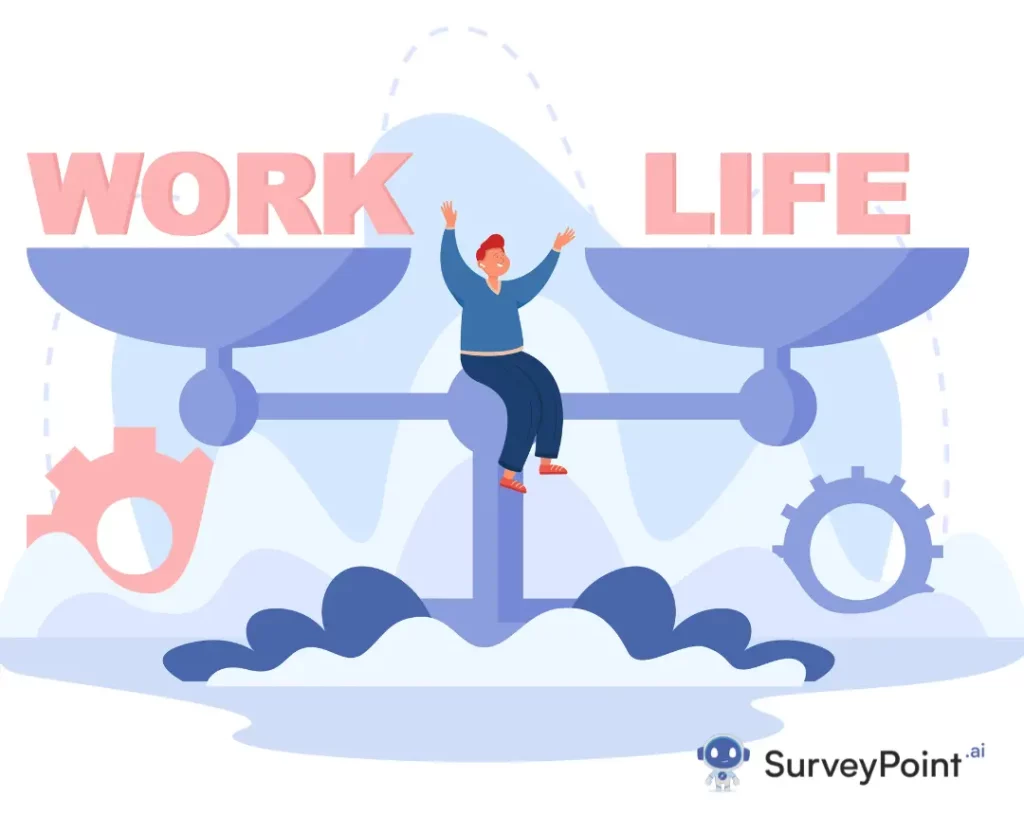
Creating a balance between work and life is a challenge in today’s fast-paced world. A job’s demands can often invade our personal lives, leading to stress and burnout. However, finding harmony between our professional and personal lives is essential for our well-being and our family’s.
Workplace stress is on the rise, and there’s no time like the present to address this pressing issue. While moderate stress can boost our focus and drive—much like the slight jitters helped Tom ace his client presentation—chronic stress can result in discontent, disengagement, and even burnout.
It’s essential for everyone, from entry-level employees to top-tier executives, to foster open dialogues about stress and explore methods to decrease its effects. This is the primary goal behind initiatives like the upcoming and increasingly recognized ‘Stress Awareness Month’.
In our blog post, we’ll delve into Stress Awareness Month, highlight the significance of enhancing communication with staff members (including conducting surveys), and provide practical tips to address stress in the workplace.
What is Important About Stress Awareness Month?
Stress Awareness Month is when we spotlight something many of us face but might not always talk about stress. It’s like that heavy backpack you carry around; it might not seem like a big deal at first. But over time, it can really wear you down. That’s why ‘Stress Awareness Month matters, and here’s a simple explanation.
We can equate our daily lives with a busy road filled with all sorts of tasks and responsibilities. Like cars zooming by. Sometimes this traffic runs smoothly, but other times it becomes a traffic jam. Stress is like that traffic jam. It’s when the demands of work, family, and everything else pile up and you feel stuck, unable to move forward.
During Stress Awareness Month, we recognize this “traffic jam” in our lives. We learn about what causes stress and what it does to our bodies and minds. Did you know that stress can make you feel tired, anxious, or even sick? It can, and that’s not good for anyone.
But the best part about Stress Awareness Month is that it’s not just about identifying the problem; it’s about finding solutions. We learn about tools and techniques to manage stress, like taking deep breaths, going for a walk, or talking to a friend. Think of these as different paths to avoid that traffic jam.
It’s also a time to remember that it’s okay to ask for help. Just like you might need a map to find your way out of a traffic jam, sometimes you need a little guidance to deal with stress. That might mean talking to a professional or finding support from friends and family.
By doing so, we’re not just taking care of ourselves but making our entire community a happier, healthier place. It’s like clearing up that traffic jam and getting back on the road to a smoother, more enjoyable life.
Why is it important to have open lines of communication?
Open communication channels are crucial in both our personal lives and professional environments, and here’s why, explained in simple terms:
- Building Trust: When people talk openly and honestly with each other, they build trust. Imagine you’re working on a team, and everyone shares what they’re doing and why. You’ll likely feel more comfortable knowing what’s going on and trust that everyone is working together towards the same goal.
- Solving Problems: Open communication helps in identifying and solving problems faster. If something’s wrong and nobody talks about it, the issue can become bigger. But if people feel free to speak up, problems can be addressed immediately, just like noticing a small leak in a pipe before it bursts.
- Boosting Creativity: When people feel free to share their thoughts and ideas, creativity flourishes. Think of it like planting different types of flowers in a garden. If everyone adds a different type of flower, you get a beautiful and diverse garden full of fresh ideas.
- Enhancing Relationships: Open communication helps people understand each other better. It’s like talking openly with a friend about what you like and doesn’t like, enabling you to get along better. Understanding your colleagues’ viewpoints can make collaboration smoother and more enjoyable in the workplace.
- Reducing Confusion: When communication is clear and open, misunderstandings are less likely. Imagine playing a game where everyone knows the rules. Playing and having fun is much easier when everyone’s on the same page.
- Encouraging Growth: Open communication encourages personal and professional growth. It’s like having a coach who tells you what you’re doing right and what you need to improve. This feedback helps you learn and grow.
- Creating a Positive Environment: Open and friendly communication often leads to a more positive environment. It’s like being in a room where everyone smiles and chats; it feels welcoming and warm.
Knowing Feedback Through Surveys
Surveys enable employees to anonymously share their thoughts and feelings about their work-life balance, job role, relationships with colleagues, and more. Using simple and straightforward questions, a company can gather valuable feedback that may not be revealed face-to-face.
What Kind of Questions to Ask?
When creating a survey to measure workplace stress, it’s vital to ask questions that tap into the key aspects of an employee’s experience. Here are some examples:
Job Satisfaction:
“On a scale of 1-10, how satisfied are you with your current role and responsibilities?”
Workload:
“Do you feel your workload is manageable, or do you often feel overwhelmed?
- Manageable
- Sometimes overwhelming
- Always overwhelming
Support and Relationships:
How supported do you feel by your colleagues and management?
- Very supported,
- Somewhat supported,
- Not supported at all
Work-Life Balance:
Do you feel you have a healthy balance between your work and personal life?
(Yes/No)
Stress Levels:
In the past month, how often have you felt stressed at work?
- Rarely
- Occasionally
- Frequently
- Always
How Surveys Make a Difference
By posing these types of questions, employers can gain insights into areas that may be contributing to workplace stress. For instance, if many employees report feeling overwhelmed by their workload, management can take steps to redistribute tasks or provide additional support.
The anonymity of surveys often encourages more honest and open feedback. People may feel more comfortable sharing their true feelings without fear of judgement or retribution.
Tips to Understanding the Importance of Balance
A balanced life is about dividing time equally between work and personal life. It’s also about finding a fulfilling career, healthy relationships, personal growth, and relaxation. An imbalanced life can lead to stress, anxiety, health problems, and strained relationships. Let’s explore strategies to create harmony.
Below are a few human-centric strategies to improve balance and reduce workplace stress:
1. Set Clear Boundaries
Work Hours:
Stick to regular working hours. When the workday ends, switch off work emails and notifications. Create a distinct separation between work and home to disconnect mentally.
Personal Time:
Ensure that personal time is respected as well. Engage in hobbies, spend time with loved ones, or indulge in self-care.
2. Prioritize and Plan
Identify Priorities:
Know what matters most. Is it a project deadline, a family dinner, or hobby? Recognize what needs immediate attention and what can wait.
Plan Ahead:
Use planners or digital tools to schedule both work and personal activities. Planning helps in making informed decisions without compromising one aspect of life for the other.
3. Communicate Openly
Talk to managers and family about your work commitments and personal needs. Clear communication reduces misunderstandings and helps in mutual support.
4. Embrace Flexibility
Life is unpredictable. Be open to adjustments. Flexibility reduces stress and makes it easier to cope with unexpected situations.
5. Practice Mindfulness and Meditation
Mindfulness exercises and meditation are powerful tools to calm the mind. They encourage a focus on the present moment, reducing anxiety and stress.
6. Build a Supportive Network
Lean on friends, family, or colleagues when things get tough. A supportive network can provide encouragement and assistance when needed.
7. Pursue Personal Growth and Hobbies
Engaging in hobbies or personal development activities enriches life and relieves work-related stress.
8. Consider Professional Help if Needed
Professional coaches or counselors can provide personalized strategies tailored to individual needs.
Conclusion
Balancing life and workplace stress is not a destination but a journey. It requires constant adjustment and awareness of one’s needs and surroundings. The strategies mentioned above are simple yet effective ways to create harmony and reduce stress.
Ultimately, it’s about finding what works best for you and being gentle with yourself. Balance doesn’t mean perfection; it’s about creating a fulfilling life where work and personal life coexist in harmony.
It’s okay to seek help, take breaks, and prioritize yourself. After all, a happy, healthy life is a more productive one! For more information checkout surveypoint.ai




